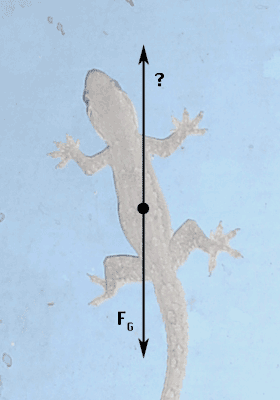|
What is "?"
in the picture?
We know the force of gravity pulls the lizard downwards, as shown in
the picture on the right. So in order for him to stay on the wall, there
must be a force of equal magnitude acting in the upward direction. Where
does that force come from? The answer depends on what type of creature
we're talking about.
What is the mysterious force?
The most common answer is friction. The microscopic interaction between
an animals tiny hairs or claws and the climbing surface acts as a force
that opposes gravity. However, this strategy requires that the climbing
surface have a degree of roughness, like tree bark or bumpy walls. Even
walls that look smooth often have enough friction for insects to crawl
on them because FG is so small that very
little friction is needed to counteract it. For lizards that need friction,
smooth surfaces like glass may be unsurmountable. However, there are other
mechanisms for "sticking" to surfaces.
How can certain creatures climb on low-friction surfaces?
|

